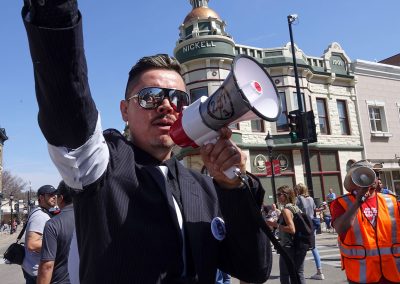
Four months after Waukesha County jail officers were certified to assist in immigration enforcement, immigrant rights advocates say the move has induced fear — but has also strengthened their movement.
Earlier this year, Waukesha County jail officers became the first local officials in Wisconsin authorized to enforce immigration laws by entering into an agreement with the federal government. The move prompted sharp criticism and massive protests, but the department has proceeded as planned, and officers completed training and certification in July. Four months in, local immigrant advocates say the fear is palpable, but so is the resistance.
In May of 2017, Waukesha County Sheriff Eric Severson applied to join the federal government’s 287(g) Delegation of Authority Program, which would deputize local law enforcement officers to act as immigration agents within the county jails.
The federal 287(g) program was created in 1996 but was scaled back under President Obama. The Trump administration has reinvigorated it as part of a plan to use local law enforcement to increase deportations nationwide. At present, more than 1,514 officers have been certified through 78 such agreements in 20 states.
Growing Fear
Veronica Esquivel, an immigrant who has lived in Waukesha for 19 years, said she can feel a difference since the department joined the program.
“Fear. That they are more strict. That the sheriffs, for any reason can ask one’s immigration status,” she said. She worries that the sheriff’s officers might come onto the bus or to her work, though the 287(g) agreement only authorizes the designated officers to investigate immigration status inside the jail.
Until 2017, departments could also enter into “task force model” or “hybrid model” 287(g) agreements that allowed designated officers to enforce immigration laws and conduct immigration arrests in the streets. However, those models were discontinued because of the growing concern about the local-federal collaborations promoted through the Secure Communities program.
The sheriff’s department declined to respond to questions about the objectives or results of the department’s 287(g) agreement. In an October press release, Sheriff Severson stated, “I have determined, after consultation with legal counsel, that the best way to honor my responsibility to cooperate with ICE and protect the public, while at the same time honoring my oath to preserve, protect and defend the Constitution, is through participation in the 287(g) program.”
But that is little reassurance to Esquivel. She has a car and used to have a driver’s license — until 2007, Wisconsin issued driver’s licenses to undocumented immigrants — but she said she has stopped driving for fear of accruing tickets and ending up in Sheriff Severson’s jail.
“Right now, driving for me would be like risking — as we say in Mexico — putting myself in the wolf’s mouth,” explained Esquivel.
Instead, she takes the bus or ask for rides to the job where she has worked as a dishwasher and prep cook for six years, and she walks to Walmart. But she said her husband often drives to work, and notes that many areas are not easy to access by bus.
“I see the people… some afraid, some not afraid, but they keep driving,” she said. “They keep driving because they say, ‘I have to, because I don’t have another option.’”
She said she knows of people in the county who have ended up in immigration detention or deportation, but she hasn’t been able to assess the actual impact of the 287(g) agreement because she doesn’t know the details of the cases or whether the person might have had a similar outcome before the agreement. The sheriff’s department declined to release this information.
Growing Distrust
Pastor Emmanuel Rios of Casa de Restauracion church in New Berlin, Wis. worries about the impact of the new program for his congregation — which he says is 95 percent Hispanic.
He hopes “that people will be able to come to church without any problem, without worrying that the police will stop them on the way there or on their way home.”
He said he has already seen a change in his youngest parishioners, who he thinks are picking up on their parents’ fears.
“When children of seven, eight and nine tell you, ‘I don’t see the police as my friends or as my helpers,’ that is really [worrisome]… because if those kids grow [up] with that thinking, maybe they will have problems with authority when they grow [up],” said Rios.
Trust in law enforcement is a predictable casualty of the collaborations, according to the Major Cities Chiefs Association. That is one of the reasons they advised local law enforcement against the practice in a 2006 position statement. “Without assurances that contact with the police would not result in purely civil immigration enforcement action, the hard won trust, communication and cooperation from the immigrant community would disappear,” warned the statement.
Adding to the public distrust, immigrant rights advocates accused the sheriff of applying in secret — the move was not publicly announced until the ACLU of Wisconsin obtained the application through a public records request.
Growing Resistance
But the sheriff’s decision has had unexpected impacts. Mario Ramirez, lead organizer at immigrant advocacy group Voces de la Frontera, says the 287(g) agreement has only increased the power of the immigrant rights movement, as advocates have upped their efforts to organize and inform local immigrants.
Thousands of demonstrators marched through Waukesha’s streets on May 1 for “A Day Without Latinos.” And on the Saturday after the Sheriff’s Department officers finished ICE training, Voces de la Frontera held a “Family Defenders” training to prepare at-risk families and their supporters. A month later, the Milwaukee-based organization opened a Waukesha office.
The sheriff’s 287(g) participation follows other moves to increase immigration enforcement in the state, including state bills in 2015 and 2016 to punish local governments that choose not to do immigration enforcement. But, Ramirez said, those bills — both unsuccessfully — also backfired.
“The more they step on us, the more strength it gives us to come together. And thanks to these attacks, the organization has grown a lot,” said Ramirez, noting that Voces de la Frontera now has eight chapters around the state.
Esquivel might not be driving anymore, but she is now one of the leaders of the Waukesha chapter. She had previously participated in the organization’s 2017 efforts to pressure Milwaukee Sheriff David Clarke to abandon his own much publicized 287(g) plans. Clarke resigned in August 2017 without explanation, and the ICE denied his application. Esquivel counts that as a victory, and it motivates her to continue organizing her community.
“We want to let people know to not be afraid since we all come together and we all support — we all want the same thing,” she said, adding that she’s constantly inviting people to attend Voces meetings and get informed.
Next week, she will be posting flyers in laundromats and stores for a December 15 meeting about driver’s licenses. Governor-elect Tony Evers campaigned on support for restoring access to driver’s licenses for undocumented Wisconsinites, but the deal is far from sealed.
In the meantime, Ramirez said Voces will continue to educate people on their legal rights, including the right to remain silent, to speak to a lawyer, and to not consent to a search without a warrant signed by a federal judge.
Ramirez said it could take years to change Waukesha County’s immigration enforcement approach, but, he is optimistic — he’s seen the movement win before.
“Our people know very well in this state that when there’s a strong attack on our community, that we have this weapon that defends us from that and gives a lot of results,” said Ramirez, citing the impact of past strikes by immigrant workers. He says the 2016 “Day Without Latinos” strike prompted dairy farmers to take a public stance against AB450, a bill that would have prohibited and fined “sanctuary cities.”
“They say they don’t need us, that they don’t want us,” said Ramirez, referring to public opinion about immigrants. The latter may be true, he said, but the former has been proven false repeatedly.
“We realize how powerful our contribution is to the economy of this state but also on the national level,” Ramirez said. “In fact, if we all did the same on the national level, I believe a lot would change.”
Pastor Rios shares that optimism.
“As Christians, but also as people, we have hope that — since government leaders come and go and it’s God who really places and removes them in some moment, it can change,” he said, explaining that he hopes for a leader who might offer immigration relief to the millions of immigrants who have lived in the U.S. for years.
He knows his hope does not mesh with current politics, but he is used to that contradiction.
“It might be irrational,” he adds, “but we live more by faith than by sight.”
Natalie Yahr
Susan Ruggles, Joe Brusky, and Nick Hansen
Originally published as What’s come of Waukesha County’s ICE collaboration?


















